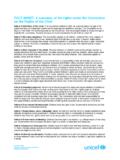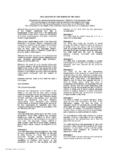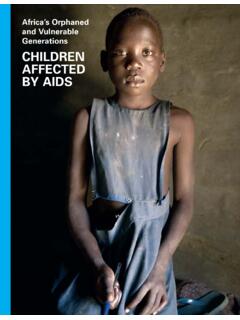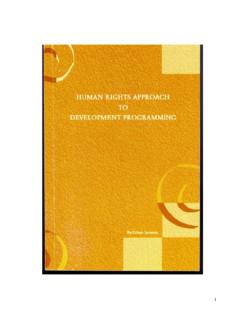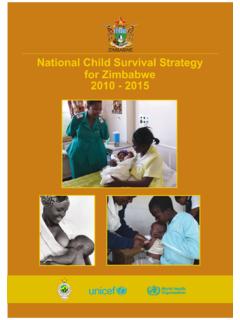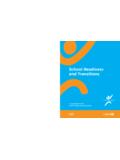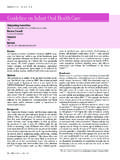Transcription of Building the System - UNICEF
1 October 20132 Contents Acknowledgements ..3 Introduction ..4 Learning Objective 1: Define supportive supervision/mentoring and terms related to programme monitoring; and define components of supportive supervision: who, why, when, where, what, how, and what for ..9 Learning Objective 2: Review Job Aids for IYCF Community Workers: IYCF Counselling, Action-oriented Group and IYCF Support Group facilitation; registers and activity logs ..13 Learning Objective 3: Review tools for supervisors/mentors: observation checklists for performance of IYCF support activities and routine programme monitoring Learning Objective 4: Help mentors/supervisors develop the necessary skills: interpersonal communication, facilitation, analysis, and problem-solving.
2 16 Learning Objective 5: Practise supportive supervision/mentoring (using observation checklists, providing feedback, and making decisions for quality improvement throughout the System ) ..19 Learning Objective 6: Compile and present data in a report that tracks the status and progress of the IYCF programme: proportion of planned activities implemented, coverage of target population, and quality of IYCF support activities ..21 Learning Objective 7: Develop an Action Plan to help institutionalize supportive supervision/mentoring and monitoring in Community IYCF programmes ..22 Appendix 1: Programme Monitoring Matching Game - Definitions related to Programme Monitoring ..24 Appendix 2: Components related to Supportive Supervision/Mentoring.
3 26 Appendix 3: Skills for the Different IYCF Support Activities ..28 Appendix 4: Chart of Job Aids for Community Worker and Tools for Mentor/Supervisor ..30 Appendix 5: List of Tools for Community Workers and Mentors/Supervisors ..31 Appendix 6: Job Aids for Community Workers (6) ..32 Appendix 7: Tools for Mentors/Supervisors (9) ..39 Appendix 8: Completed Job Aids/Tools for Compilation by Mentors/Supervisors ..54 Appendix 9: Compilation Answer Sheet ..68 Appendix 10: Examples of Indicators for Routine IYCF Programme Monitoring ..69 Appendix 11: Data for IYCF Programme Planning ..71 Appendix 12: Examples of How to Visually Display Routine Programme Monitoring Data ..72 Appendix 13: Addition of indicator examples - Implementation of activities (how much did we do?)
4 75 Appendix 14: Action Plan Template for Supportive Supervision/Mentoring and Monitoring of Community IYCF Programme ..78 Appendix 15: Feedback on the materials and activities associated with Learning Objectives from Supportive Supervision/Mentoring and Monitoring ..79 3 Acknowledgements This 1-day Session on Supportive Supervision/Mentoring and Monitoring is part of the Community infant and Young Child feeding (IYCF) Counselling Package, developed by the United Nations Children s Fund, New York (for UNICEF : Christiane Rudert, Nutrition Specialist, infant feeding ), with technical assistance from Nutrition Policy and Practice (for NPP: Mary Lung aho and Maryanne Stone-Jimenez). Grateful acknowledgment is given to the UNICEF Nigeria and UNICEF Regional Office of South Asia (ROSA) countries: Philippines, Nepal, Indonesia and Bangladesh for participating in the field testing of the Supportive Supervision/Mentoring and Monitoring module.
5 Although these materials have been copyrighted by UNICEF , any part of this session may be printed, copied and/or adapted to meet local needs without written permission. Requests to reproduce the materials may be directed to: In addition 1) the source of the original materials should be fully acknowledged, 2) the parts of the session that are printed, copied and/or adapted should be distributed free or at cost (not for profit), and 3) credit must be given to UNICEF . 4 Introduction Purpose of Supportive Supervision/Mentoring and Monitoring Training Over the course of community IYCF counselling training, community workers (CWs) gain new knowledge and skills that will enable them to provide IYCF support to help mothers/caregivers feed and care for their infants and young children according to global recommendations.
6 To gain competence in providing the support, workers need practice in applying the knowledge and skills to perform particular tasks, and the ability to decide when applying a skill is appropriate. This requires more practice than can generally be obtained as part of the training during field practice sessions. Participants can practice skills independently following the training and increase their abilities, but will also need additional support/supportive supervision/mentoring to ensure that they are carrying out a task correctly. Supervisors are sometimes the Trainers of the CWs. They may or may not be attached to a health facility in the area to which the CW is assigned. Other individuals who have completed the community IYCF counselling training and are themselves skilled counsellors may also be trained to provide supportive supervision or mentoring.
7 In either case, a mentor/supervisor must have also completed training in supportive supervision/mentoring and monitoring, which aims to build the skills of supervisors to monitor the performance of Community Workers (planned activities implemented, coverage of target population, and the quality of IYCF support activities), and to help strengthen their performance where gaps are identified. All newly trained CWs should receive at least one supervisory visit within 6 weeks to 2 months following training. This initial follow-up supervision will provide the opportunity to determine whether the newly-trained IYCF CWs are: using their knowledge and skills to counsel mothers/caregivers and facilitate group work feeling confident about what they are doing experiencing particular difficulties This will also provide an opportunity for the supervisor to observe the CW working with mothers/caregivers, compare their performance to standards that are outlined in a supervision checklist, and provide constructive feedback on both the strong points and any difficulties the CW has experienced.
8 Supervisors/mentors will then be able to judge the effectiveness of the initial training and provide on-the spot refresher training as needed. Ideally, supportive supervision/mentoring is part of routine monitoring activities and the initial visit will fit into a schedule of ongoing supportive supervision. If a System of ongoing supervision or mentoring is not yet in place, all newly trained IYCF CWs should receive a minimum of 2-3 visits and then participate in regular meetings with other IYCF CWs for sharing experiences, mutual support and on-going or refresher training. Where supportive supervision/mentoring is part of routine monitoring, data obtained as part of supervisory visits and reporting can help to monitor whether defined targets for activities were met during a reporting period, as well as assess the performance of individual CWs and the coverage achieved.
9 Monitoring a small number of clearly defined indicators will help to keep the community IYCF programme focused on the essential activities and provide information for assessing overall programme progress. Examples of useful indicators and tools to assist in their collection are provided in this module (see Appendix 3: Flow Chart of Tools for Community Worker and Supervisor). 5 Layout of this one-day training: The day is organized into 7 Learning Objectives (LOs). LO 1 introduces the concept of supportive supervision/mentoring. During LO 2, the Supervisors will review examples of tools and the monitoring forms that the CWs will use to record their activities and submit to their Supervisors (monthly/other period).
10 These tools are templates that will need to be adapted for use in the local situation. LO 3 introduces the Supervisors to the tools that they will use to help CWs improve the quality of the IYCF support activities they perform, and to sample forms that can be used for compiling the routine programme monitoring data collected by the CWs in the Supervision Area. In LO 4 and 5, the Supervisors will practice to develop the necessary skills to implement supportive supervision/mentoring and use the tools to monitor and record their activities. During LO 6, the Supervisors will review examples of indicators and data compilation forms for routine programme monitoring, and discuss examples of different visual presentations that might be used in reporting their data.



